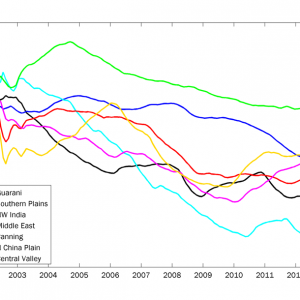The Stream, October 31: Halloween Scare — World’s Aquifers Are Disappearing
The Global Rundown |
The world’s aquifers are disappearing, and the Aral Sea is vanishing. Researchers from Massachusetts have deduced that the water on earth has been here since the planet’s formation, while scientists from Nebraska and Illinois have written a computer program for buying and selling water rights. Record floods in August caused mass amounts of sewage to flow into the waters of Southeast Michigan. Both Chile and Ethiopia are battling drought, though their strategies are vastly different. Citizens of Israel will soon save on their water bills.
“Today, the Aral Sea is on the verge of disappearing entirely. This loss would affect millions of people in Uzbekistan and beyond …I call for intensifying the international response to this disaster.” — Ban Ki-moon,U.N. Secretary General, on the drying of the Aral Sea. (RIA Novosti)
By The Numbers |
10 billion gallons Amount of sewage spilled into Southeast Michigan’s waterways as the result of historic August floods. Detroit Free Press
10 percent Expected decrease in Israel’s water rates in 2015 thanks to greater operational efficiency. The Jerusalem Post
Science, Studies, And Reports |
Nearly all of the world’s major aquifers are in decline, according to data collected by NASA’s GRACE satellite mission, and Professor Jay Famiglietti of the University of California-Irvine says that the world is not paying enough attention. Circle of Blue
Researchers from the University of Nebraska and the University of Illinois at Urbana-Champaign have written a computer algorithm to assist with the complex process of buying and selling water rights. National Science Foundation
The water on Earth is just as old as the Earth itself, and not the result of a later comet collision as previously thought, according to a new study from the Woods Hole Oceanographic Institute in Woods Hole, Massachusetts. National Geographic
On The Radar |
In Chile, $US 19 million has been allocated to drill wells, build reservoirs and expand rural water service in response to drought in the Valparaiso region. BNamericas
One sixth of Ethiopia is set to be “regreened” by 2030—restored and covered with vegetation at little cost in order to prevent drought, soil erosion, and flooding. Guardian
is both a scientist and a journalist, she holds an MS in Environmental Engineering from Michigan Technological University, and she brings proficiency in ESRI’s ArcGIS mapping software.





Leave a Reply
Want to join the discussion?Feel free to contribute!